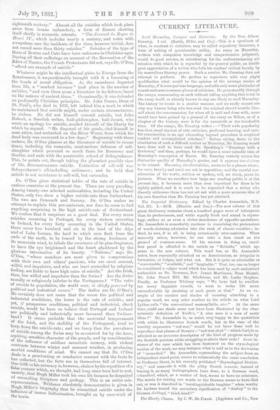CURRENT LITERATURE.
Lora Macaulay, Essayist and Historian. By the lion. Albert
Canning. I vol. (Smith, Elder, and Co.)—This is a specimen of what, in contrast to criticism, may be called expository literature, a form of writing of questionable utility. An essay on Macaulay, written with competent knowledge and comprehensive judgment, would do good service, in substituting for the undiscriminating ad- miration with which he is regarded by the general public, an intelli- gent appreciation of a writer who lulls his readers' critical faculty by his marvellous literary power. Such a service Mr. Canning does not attempt to perform. Ho prefers to reproduce with very slight qualification what would be the opinion of the average reader of Macaulay, if it were put into language, and adds only some platitudes of morals and some common-plaeos of criticism. Ile goes steadily through the essays, commenting on each without telling anything that isnot in the essay itself, or already known to any one likely to read Macaulay. The history he treats in a similar manner, and we really cannot see why any human being who has read the original should trouble him- self about the commentator, for when all is said and done with, more would have been gained by a perusal of the essay on Milton, or of a chapter of the history, wore it for the twentieth or the hundredth time. Of the essays, Mr. Canning writes :—" Their wide popularity has thus stood the test of able criticism, profound learning, and care- ful examination, in an age abounding beyond precedent in sceptical readers and accomplished scholars." Before sitting down to the elucidation of such a difficult author as Macaulay, Mr. Canning would have done well to have read Mr. Spodding's "Evenings with a Reviewer," and then, perhaps, he would have a more valuable idea of Macaulay's conception of Bacon. Mr. Canning entirely misses the distinctive quality of Macaulay's genius, and it appears too obvious to be missed. Macaulay, the rhetorician, seems to be a phrase where, for once, brevity and truth are not in opposition; and the careful con- sideration of his works, written or spoken, will, we think, prove its justness. When we recollect how large our reading public is at the present day, it becomes more than over important for them to be rightly guided, and it is much to be regretted that a writer who directly addresses them has not set out with a more accurate idea of his own function than Mr. Canning has yet attained.


































 Previous page
Previous page